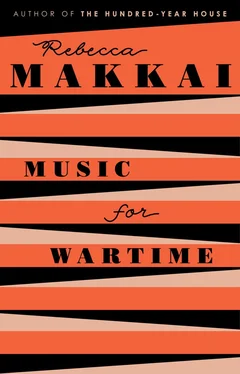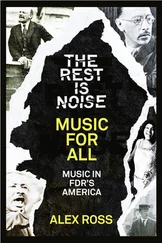When the Soviets came in 1944 they at least made things safe for the Jews, despite the lines for bread and the men like Ceausescu and the posters telling you to work harder. “They rescued us from Hell to Hades,” Aaron’s father said. He always said “us,” though he’d never been back. At the end of the war Radelescu, recovered from malnutrition, returned to his old university post. The Communists favored him, sponsored his concerts, and then suddenly put him in prison. What he had done to fall from grace Aaron did not quite understand, but then his father knew many people they had put in jail. It was what the Communists did best.
Aaron suddenly stumbled back into the consciousness of his own playing, and wished he hadn’t. His instinct had been carrying him along, but now he had to stop and think where he was, second-guess, catch up, count. He felt everyone’s eyes on him except Radelescu’s; the old man was lost in the music. Radelescu did not close his eyes when he played, but he squeezed his face tight and gazed into the middle distance.
Everyone knew the story of Radelescu’s time in jail, and so there wasn’t much for Aaron to figure out. When they first took him there, they wanted to ensure that he would never play violin again. The guards observed which hand he ate with, and when they were sure it was the right, they took him to a room and chopped off the ring finger of that hand. They had been allowed one finger, and they chose the one that would allow them to take the signet ring otherwise irremovable over the man’s swollen knuckle. They weren’t, any of them, musicians, or they would have known that he used his right hand for bowing, his left for fingering. And they would have understood, furthermore, that losing a pinky would have been more crippling. Or, Aaron realized, maybe they were musicians. Maybe that was the point. All it would take was one sympathetic, music-loving guard to slyly convince the others that this was the finger to pick.
After the bandage came off, Radelescu set about building a silent violin in his jail cell. From the cuffs of his prison uniform he pulled out a great many threads and braided them together to make the strings. He knew the thickness of each by heart. Next, from the wooden base of his bed, he took a thin board. He rubbed down the sides until it was the width of a violin neck, then took a nail from the bed and carved notches for the strings. And then with more wood and more gray linen threads, he made a bow. Every few months, the guards would find the violin hidden in his bed and take it away, but he would make a new one. All the beds were wood, so they could not stop his efforts to wrench instrument after instrument from the bones of the prison. Aaron wondered why they didn’t take it all away and make him sleep on the floor, but perhaps even the Communists had rules of fair treatment. Perhaps they liked the game. With a nail, Radelescu carved onto the back of each model the name of his fellow teacher, the pianist, as if that man were the maker of the instrument: Morgenstern, it said, in place of Stradivari.
It hadn’t occurred to Aaron before now that of course the piano teacher had been Radelescu’s boyfriend. He didn’t receive this as a vision so much as recognize the clues, now that he was old enough to know about these things. This was the reason his father had always spoken of the two men together, as one entity, but in a voice that held some unspeakable tragedy. And it was true that Radelescu was here alone. Either the pianist had died or had left him during the long prison sentence. But Morgenstern’s last album, the one from 1986, showed a healthy older man, his eyes bright and his cheeks rosy. So he had left him. While Radelescu had been carving the pianist’s name, that man had forged some other life that was not made only of prison and memory and loss.
Five times a day, immediately after the guards had passed, Radelescu would take his violin from its hiding place and play one of the pieces he remembered. His prison cell would be silent but for the scraping of string on string.
What Aaron tried to feel, now, was what actual music would sound like to the old man, what that first thick scratch of real violin sounded like after twenty years’ silence. As rough and raw as a dried-out throat.
Again suddenly he was back in the music, picturing the notes on the page, and he heard his part come out all wrong — not wrong just to him, but audibly wrong to everyone in the room. He waited a beat to rejoin on the right note, but found it was like a train he’d missed. Radelescu glanced at him, then seamlessly picked up the melody. He turned so Aaron could see his fingers on the strings. Aaron copied him until he got back the stream of things himself, and Radelescu returned to floating between the structural notes and motifs of the other three string parts.
Looking out at the gathered faces, Aaron saw that they were all smiling indulgently, that it was no consequence to them whether he flubbed his part or not. He realized they did not see him and Radelescu as two musicians, but saw Aaron as youth personified, a living example of what the old man had lost. They were thinking, He has his whole life ahead of him . They were thinking, Oh, how he must be inspired now to work for the things Radelescu lost . They were thinking, Lucky American boy, he does not know suffering .
Aaron kept playing, but not as well as before. He took no risks with the tempo now, but tried to stay steady and count.
His father had moved out to the front of the crowd, and it was easy for Aaron to read his mind: He was giving a gift. Maybe this was all a gift to Aaron, something he felt his son would understand more as he grew older and treasure as a memory — or maybe it was a gift for Radelescu, a younger version of himself returned to the master teacher. Aaron saw in his bright eyes and the clench of his jaw how his father was willing together the old and the new. The ghosts flew over his head like kites.
Aaron could not stand his father’s face like that, and he looked away, but not in time. Nausea flooded him, stronger than that day in Bonn, and the flow of the music was utterly lost. He shook, and the bow flailed loose in his hand.
In an instant he realized two things, and the first of them, most starkly, most obviously, was the core of the guilt in his father’s face: that his father was not simply lucky, but had looked to leave Romania, had left early for Juilliard on purpose, had left behind his family and girlfriend, his teacher — not in order to study, but in order to save himself. And what was wrong with that? What was wrong with getting out? It was the same thing Morgenstern must have done, moving his piano across town, never walking by the jail, and even Radelescu had saved himself in that little building, from the gunshots that killed the women, from the trains that drove the men back and forth across the country until they all died from heat. Except escaping is its own special brand of pain, and tied to you always are the strings of the souls who didn’t save themselves.
But the second and more devastating thing was this: These were not divine revelations available only to Aaron. They were common sense, floating for anyone to see, more tangible and opaque than any ghost. He’d missed them simply because he lived here in America and now in the present — and the air was filled with things he would keep missing forever unless they happened to hit him, sudden and accidental as an errant knife.
It was when Radelescu stopped playing and turned with concerned eyes that Aaron began to cry like a much younger child. He was tired like he’d never been, and the wet chill of a fever washed unmistakably over him, and the room was a storm-tossed boat. When he sank to the ground he felt hot urine on his leg and ankle. He still gripped the violin in his left hand and the bow in his right, remembering somehow not to let them drop.
Читать дальше












